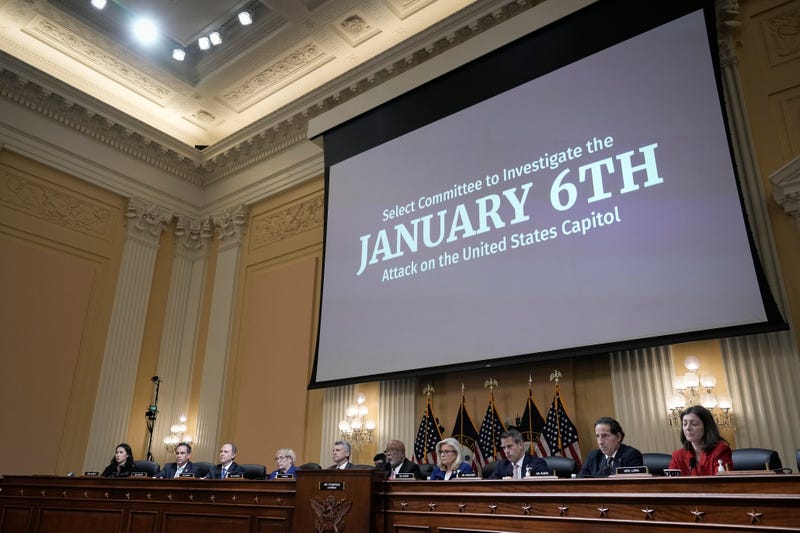
Buffalo, N.Y. (WBEN) - It was announced Thursday afternoon that the House Jan. 6 committee has voted unanimously to subpoena former President Donald Trump for testimony regarding the 2021 Capitol attack in Washington, D.C.
“We are obligated to seek answers directly from the man who set this all in motion, and every American is entitled to those answers,” said committee vice chair, Rep. Liz Cheney on Thursday.

The panel has presented interviews with Trump's aides and new documents detailing his unflagging multi-part efforts to overturn his loss in the 2020 Presidential Election to Joe Biden.
The vote seeking Trump’s testimony comes as the panel has produced vivid new details and evidence of Trump’s state of mind, as he refused to concede his loss to Biden, resulting in the 2021 attack at the Capitol.
Before that, the panel showed previously unseen footage of congressional leaders phoning officials for help during the assault.
"Not terribly surprising, given the composition of the committee and, perhaps, the need to do something quickly prior to the presumed Republican takeover in January," said Professor with the University at Buffalo's Department of Political Science, Jacob Neiheisel of the subpoena issued.
While there are those who think this subpoena is more of a political action more than anything else, prominent local attorney Paul Cambria is interested in seeing whether Trump will claim some form of executive privilege, saying there's a separation between the executive branch and legislative branch.
"The court, or a court, will have to decide whether or not that subpoena can be enforced," said Cambria. "My guess is the next move is you'll hear that a motion to quash the subpoena has been filed by Trump's lawyers, and they will claim executive privilege, among other things."
The motion to quash - a request made to a higher court to render a decision made by another, lower court as invalid - will be decided upon by a judge, in terms of whether or not there is a legal basis for him to lock appearing before Congress.
While this may be the next move made by Trump and his lawyers, there are still unanswered questions that are leaving many guessing as to whether or not the subpoena handed down to the former President will actually require him to appear before Congress.
"I think technically he is supposed to appear before Congress. What kind of enforcement mechanism there is in place is another question," Neiheisel said. "Certainly, there's the idea of contempt, but there's not exactly a congressional jail that they can stick people in if you're in contempt of Congress. So the enforcement mechanism, that remains somewhat unclear, and somewhat untested."
Another interesting aspect of this case is, assuming the court says the subpoena can be enforced and Trump must appear before Congress, Cambria says the former President then could have the option of invoking his Fifth Amendment privilege, which no court can take that away.
If the court then allows the subpoena to be issued after the motion to quash was requested - requiring Trump to appear before Congress - and the former President does not make that appearance, then Trump could held in contempt.
"What would happen, it's interesting, if the court orders him to comply with the subpoena, the court could also take the position, it would be contempt of court and not just Congress," Cambria said.
As for making the determination whether or not to quash the filed subpoena by the Jan. 6 committee, Cambria says the question would be, what's the legal basis?
"Is executive privilege a legitimate basis? Is it more pronounced when it's the legislature versus the executive branch than it wouldn't be if it's simply a court case? Those will be the issues that the court will have to wind through," he said.
If Trump tries to throw legal roadblocks up to avoid appearing before Congress, Neiheisel believes it's possible that the committee, and possibly Congress, will move quickly to say the former President is in contempt of Congress.
"I think Trump's strategy here is to slow walk it the best you can until after November, and frankly, after January," Neiheisel said. "I think Democrats will try to move quickly. Trump will try to do everything he can to avoid the contempt of Congress charge."
Meanwhile, Thursday's committee hearing was the last before the upcoming midterms on Nov. 8. How much of an effect does these hearings have on the midterm elections?
"I think that Democrats on Capitol Hill and elsewhere would absolutely love to keep these kinds of things in the news cycle, and in the hopes that they increase turnout among their supporters," Neiheisel explained. "I think there's a decent shot of that, but whether or not this kind of concern with the health and security of democracy override concerns with the economy or the kinds of things, that's unclear to me."

